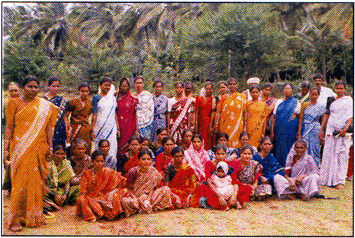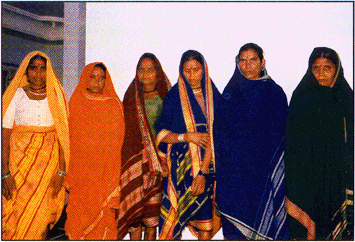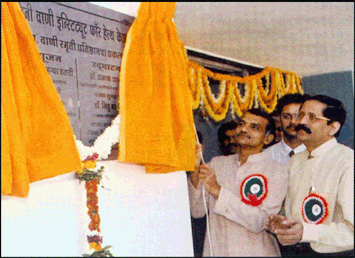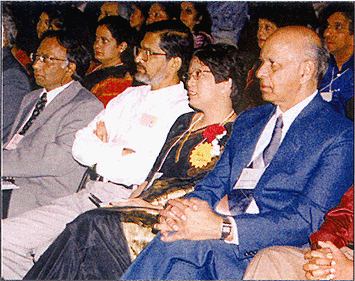|
|
|
Page No - 1
|
|
Goto Page No. 1 2 3 4
|
|
|
|
|
|
Editor: Eilish Hiebert
|
|
|
|
|
|
|
New Projects
|
|
In the last newsletter we reported about MSSO efforts to help persons afflicted with
schizophrenia and their families. These efforts are now taking a definite shape. MSSO has recognized the need for
a halfway home for the afflicted and an awareness program to educate the community at large. A preliminary project
proposal has been prepared and submitted to the Canadian International Development Agency (CIDA). However, it will
not be reviewed till late January 2002. The total outlay for the project will exceed half a million dollars, of
which close to $95,000 will come from MSSO's own sources. Additional details will be forthcoming in the next newsletter
when MSSO will have a clear decision from CIDA.
|
|

|
|
Two small projects have been approved for matching funds from the Wild Rose Foundation.
For administrative purposes, these projects have been jointly sponsored with two other organizations. The Bombay
Leprosy Project (BLP), an NGO established 25 years ago, is actively helping leprosy-afflicted persons in the slums
of Mumbai. In cooperation with the Vedanta Society of Calgary, we have sponsored their project, Rehabilitation
of Leprosy Patients, with total assistance of $13,000. The other project is Vocational Training in Food Preparation,
submitted by Manswini Mahila Prakalpa of Manavlok. The project is jointly sponsored with Maanaw Seva Association,
with total amount of assistance being $12,000.
|
|

|
|
MSSO Projects in Progress
|
|
MSSO president and Mr. Anant Gupte, MSSO's India based representative, undertook a monitoring
and assessment mission of the current MSSO projects. In a period of two weeks, beginning 24th August, they logged
more than 6000 kilometers covering all current MSSO projects. The trip covered Dhule, Nashik, Pune, Kolhapur, Belgaum,
Dharwad, Ranebennur, Davangere, Solapur, Anandnwan, Hemalkasa, and Ambejogai.
|
|

|
|
Forest Management and Environment
|
|
Industrial and commercial interests are always keen to acquire forestlands, degenerated
or otherwise, to transform
|
|
|
|
them totally to meet their interests by bulldozing all vegetation and then planting
two or three species that they need. On the other hand, the tribals and rural poor try to understand nature as
it is in all its manifestations and cooperate with it and utilize it for their basic needs in a sustainable manner.
Samaj Parivartana Samudaya (SPS) motivates the tribals and rural poor to participate in the management of natural
resources.
|
|

|
|
In a period of three days MSSO team traveled from Belgaum to Davangere covering 8 villages spread over three
districts of Karnataka. They witnessed the project results of development and preservation of forests wherein the
forest dependent people participated in Joint Forest Management program.
|
|

|
|

|
|
Women Participants of Kenchapur Village Use
of Bio-farming to Develop the Farm in the Background
|
|

|
|
Rehabilitation of Hearing Impaired: Hearing impaired children of Dhule district
did not have a proper school building. Their school was operating from rented premisesoriginally designed for family
use. Moreover, they were forced to change premises from time to time to suit the convenience of private owners.
Some children used to travel more than 30 kilometers every day to attend the school. The project was designed to
address the needs of these children and to create awareness about their problems.
|
|
|
|
|
|
|
|
|
Page No - 2
|
|
Goto Page No. 1 2 3 4
|
|
|

|
|
|
|
|
The project, jointly administered by the K.S. Wani Memorial Trust and the Institute
for Handicapped in Hearing, faced natural calamities caused by drought and escalating petroleum prices. This caused
increase in the cost of transportation, cement and steel. As a result of the drought, water was not easily available
for the construction. Notwithstanding all these difficulties, the construction of the school building was completed
in the middle of May 2001, just in time for the start of the new school year. The residence building was completed
in August 2001. The two buildings were formally inaugurated on 25 August 2001.
|
|

|
|
As a result of expanded facilities, the partner was able to add the 5th grade in the
school. Up till the last academic year the students had to seek admission elsewhere for education beyond 4th grade
or alternately drop out of the school system. The current student enrolment has increased to 73. In the next academic
year, the 6th grade will be added to the school. So far 30 students have registered for accommodation in the new
residence facility. An awareness video, Doctor, Bal Bolat Nahi, has been produced in Marathi language. An English
version will be dubbed in the near future.
|
|

|
|
Literacy and Development of Tribals: Renowned Baba Amte initiated Lok Biradari Prakalpa for Hemalkasa
tribals. It encompasses the total development of the tribal people from Hemalkasa and the surrounding region. Dr.
Prakash Amte (Baba's younger son) and his wife Dr. Mandankini Amte, based in Hemalkas, run a hospital facility,
a residence school, a vocational training centre, a wild animal orphanage, agricultural services and awareness
program.
|
|

|
|
MSSO assessment team spent two days at the project site. Aparna Velankar, a journalist
from Nashik, joined the MSSO team in Hemalkasa. In the morning the roaring of a lion (from the wild animal orphanage
maintained by Prakash) woke up the team members. During the daytime, they witnessed more than 300 outdoor tribal
patients, some traveling more than 40 kilometers. The team was impressed with the trust and confidence shown by
the tribals in Prakash. Without adequate modern medical equipment Prakash and Mandankini have achieved amazing
results.
|
|

|
|
Taking into account the fact that Hemalkasa is located in a remote forest region, the
team was impressed with the progress made by the partner in the construction of the hostel for the girls and the
quarters for two doctors who are returning to the project site. Our support for the partner encouraged the local
member of the parliament to build a guest house for the tribal patients who come from far away places.
|
|

|
|
Recently Completed MSSO Projects
|
|
Since the publication of the last newsletter, MSSO partners have completed three projects.
Consistent with the MSSO policy of self-sustainability, all three projects will support themselves and will not
receive any more funding from MSSO.
|
|

|
|
Rehabilitation of Mentally Challenged: The major part of the project was to provide
an additional school building and a residence facility for the mentally challenged children and to create awareness
about their problems within the community at large and amongst the parents of such children. The school building
was formally inaugurated on
|
|
|
|
21 January 2000. It took longer than expected to complete the residence complex, it
was completed in July 2001. An awareness video, The School That Gautam's Mother Built, was produced two
years ago. (See page 4 for obtaining a copy.)
|
|

|
|
A meeting with some 15 parents was arranged at the time of CIDA's assessment mission
in August 1999. Parents gave moving personal testimonies, affirming that the NGO partner, Prabodhini Trust, was
no less than a salvation for them because no such facilities exist elsewhere. The partner also addresses parents'
thirst for information and support. It has helped them in obtaining a proper diagnosis of their child's condition,
and in accepting the significance of that diagnosis. Several families have moved to Nashik specifically so that
their child could attend the special school or workshop run by the partner. Parents confirmed that the Prabodhini
Trust has helped their children overcome a range of behavioral problems, in addition to learning useful skills
and regaining a natural sense of joy and pride. They also expressed some imponderables, such as the fate of offspring
once parents pass away. Here too the Prabodhini Trust is forward-looking in its attempt to build a trust fund to
which parents can contribute as they would towards the marriage of their normal children. Prabodhini Trust is a
very strong institution. It is holistic in its approach and keeps pushing at the frontiers of what is possible.
In that sense, its activities are not just welfare oriented but also decidedly development oriented.
|
|

|
|
Training of Tribal Midwives: A project administered jointly by K.S. Wani Memorial Trust
and Vanavasi Kalyan Ashram covers tribal midwives in remote villages in Dhule and Nandurbar districts; some of
these villages cannot be reached even by dirt roads. At the close of the project more than 250 tribal midwives
were trained, this exceeded the original number of 225 stipulated in the project proposal. During the monitoring
visit in August 1999, the CIDA consultant verified that the trained midwives are fully converted to hygienic practice
as taught, such as clipping their nails, washing their hands and wearing clean clothes in preparation for delivery.
They are able to distinguish between those indigenous practices that were harmful and the ones that are acceptable.
Learning how to recognize danger signals in pregnancies has given them confidence. An awareness video, Dai -
A Tribal Midwife, gives a clear understanding of the background and the progress of the project. (See page
4 for obtaining a copy.)
|
|

|
|
MSSO assistance will provide a permanent school building for 100 students and a residential
facility for 50 children, currently commuting daily from surrounding rural areas.
|
|

|
|

|
|
A Batch of Trainees Present at the Inauguration
|
|
|
|
|
|
|
|
|
Page No - 3
|
|
Goto Page No. 1 2 3 4
|
|
|

|
|
|
|
|
The partners have provided the project with a permanent home in the form of an Institute
for Health Care with an associated fully equipped maternity hospital. It includes a classroom and office space,
as well as a charity ward whose patients provide midwives with the opportunity for hands-on training. The hospital
also includes a full-scale laboratory and operating facilities. Private rooms for paying patients are expected
to subsidize the charity ward and midwife training activities.
|
|

|
|

|
|
Drs. Prakash Amte and Nitu Mandke at the Inauguration
|
|

|
|
Rehabilitation of Earthquake Victims: The need of an oil extraction plant as
rehabilitation project came directly from the farmers affected by the 1993 earthquake. Already working at subsistence
level in a drought prone belt, these farmers saw their livestock and agricultural infrastructure wiped out by the
disaster. Since oil seed (sunflower and ground nut) has a low water requirement and has been grown in the area
for many years, the project in fact is built on low-risk, established agriculture practice appropriate to the precarious
climate.
|
|

|
|
More than 400 local farmers assembled at the site of the recently completed oil extraction
plant to meet the visiting assessment team from CIDA; about two-thirds of these were women. Farmers attending the
group meetings during the assessment visit mentioned several benefits of the oil extraction plant project. The
benefits mentioned include:
|
|
* Lower processing fee
* Trust in the accuracy of measurement
* Increased quantity of oil extracted
* Convenient location
* Elimination of middle-man
* Access to loans
* Confidence in the high quality of oil (no adulteration)
|
|

|
|
Hundreds of local farmers are benefiting from the processing facility
managed by Manavlok based in Ambejogai.
|
|

|
|
BMM 2001 Convention
An Opportunity to Project Development Issues
|
|

|
|
For the Brihan Maharashtra Mandal (BMM) of North America, a convention is a biennial
event. BMM 2001, their first convention of the millennium, took place in Calgary from 29th June till 2nd July 2001.
It presented a special opportunity for MSSO to publicize development issues in India to the large convention audience
of 1400
|
|
|
|
North Americans whose roots are in the state of Maharashtra. Majority of MSSO projects
are located in Maharashtra. MSSO president, Jagannath Wani, was the coordinator of the convention. He facilitated
the following two events to highlight development issues in India.
|
|

|
|
A Tribute to Savitribai Phule,
A Pioneer in Women's Education
|
|

|
|
It's hard to imagine that widows were once forced to shave their heads, and women were
barred from formal education-even forbidden to read and write. With today's equal access to education, women have
the same opportunities as men in many professions. Mahatma Jyotiba Phule and his wife Savitri risked their livelihood
and lives to bring about changes, which we now take for granted.
|
|

|
|
MSSO took the opportunity presented by BMM 2001 convention to pay tribute to this pioneering
couple. On 29th June 2001 MSSO presented to the convention delegates a solo performance, Whaya Mee Savitribai!
(Yes, I am Savitribai!), by Sushama Deshpande in Calgary's world-class concert hall, the Jack Singer Concert Hall.
The play is based on the lives of this courageous couple. Here is the synopsis of the play.
|
|

|
|
|
"You know," the heroine of the play admonishes us, "it kind of breaks
my heart when I look around with open eyes. Our times are gone, but I begin to wonder whether you people have still
stayed back where we were." A sobering thought from a couple who risked everything to carry out emancipation
work in India in the late 1800s. Brilliant communicator playwright Sushama Deshpande, pioneer female in Theatre
Journalism, has given us a gem of a period in time, when a young illiterate wife asks her husband to read to her.
Her questioning husband subsequently shares with her his puzzlement and anger over the caste system and other social
situations. This consciousness-raising leads to education for girls, despite social threats forcing the father
to evict them from his house, as he protests, "But a woman's got no right to education, son. Education makes
women flighty, wicked, thoughtless." This couple went on to break ground, myth and tradition, by questioning
the 'givens' of the late 1800s,
- the lower castes not being allowed to mix -- their shadows couldn't even fall on those of a higher caste;
- the plight of shaved-head widows, often impregnated by their late husband's relatives.
The couple went a step further by daring to adopt a baby of a higher caste born out of one such case. To alleviate
the plight of widows, the couple even mobilized the barbers who, as a result of this mobilization, refused to shave
the widow's heads.
|
|
|

|
|
Sushma also presented another solo performance depicting a fascinating representative
story of the life of a single unmarried mother, who is a dancer in Maharashtra's traditional folk arts troupe,
Tamasha. These artists have to survive under the two fold caste and gender politics. The play Tichya Aaichi Goshta
(The Story of Her Mother)
|
|
|
|
|
|
|
|
|
Page No - 4
|
|
Goto Page No. 1 2 3 4
|
|
|

|
|
|
|
|
begins with a heartfelt relationship between a mother in the Tamasha profession &
her daughter. The mother, deeply wounded by social humiliation, implements efforts to oppose the social customs
and rituals to educate her daughter and bring her up not as a Tamasha dancer but as a journalist. To achieve this
goal, she withstood social pressures as well as breakdowns in personal relationships. The daughter, in spite of
her great dislike towards her mother's art & life in her childhood, later comes to greatly appreciate and admire
her mother's struggle in life and wishes to interview her mother. The mother flatly refuses to speak with the daughter
on the subject. Instead she boldly and unexpectedly turns to address the audience directly. She speaks about her
own mother, brother, other family ties - her whole life, in fact. She especially talks about her relations with
other men. This fascinating story is a rich portrayal of a life situation that kept the audience rapt with attention.
|
|

|
|
Keynote Address by Dr. Abhay Bang
Plight of Tribal Infants Revealed
|
|
As the convention coordinator, MSSO president Jagannath Wani facilitated an invitation
to Dr. Abhay Bang as the keynote speaker. This was the first time ever in the history of the BMM conventions that
a social worker was invited to address the convention. This opportunity was generally reserved in the past for
intellectuals in the field of education, drama, literature, judiciary and science. A gold medallist from John Hopkins
University, Dr. Bang works in the tribal area of Gadchiroli in Maharashtra. He and his wife, Rani Bang, are members
of India's Population Commission. They have conducted pioneering research to improve health of rural and tribal
people of Gadchiroli district. Their research has influenced global health policies.
|
|

|
|

|
|

|
|
Chief Guest Vijay Bhatkar, Keynote Speaker Abhay Bang,
BMM Pres. Shaila Vidwans & Coordinator Jagannath Wani
|
|

|
|
On 1st July Dr. Bang delivered his keynote address, Sevagram to Shodhgram, to the convention
delegates. He narrated his experience with his development work for the tribals of Gadchiroli. In particular, he
presented the plight of newborn tribal infants in a very dramatic fashion. It was very touching and heartbreaking.
Almost everyone in the audience was moved to tears. He got standing ovation for more than five minutes. Since the
applause was getting too long, he had to request the delegates to stop. The audience
|
|
|
|
spontaneously donated more than $20,000 (Canadian) to support his work for tribals.
It is interesting to note that Dr. Bang himself never asked for donations in his speech. Notwithstanding the several
entertainment events at the convention, the keynote address of Dr. Bang was the high point. Many rated the keynote
address of Dr. Bang as the best ever in the 18 year history of BMM conventions.
|
|

|
|
MSSO Success Stories on a Video
|
|
Success stories associated with MSSO projects are available for viewing to any interested
persons on the following videos,
(1) Three Faces of Tomorrow,
(2) Gautam's Mother
(3) Dai: A Tribal Midwife and
(4) Doctor, Bal Bolat Nahi (in Marathi).
Persons donating $200 or more can request a complimentary copy of one video for every $200 donated. Others too
can receive a copy by paying $15 per video for duplicating, handling and mailing expenses. Address and other details
are given in the box below.
|
|

|
|
|
|
|
Donations to MSSO are eligible for tax credit (charity registration No. 10765 4410 RR
0001). Donations and/or requests for MSSO videos may be sent to:
|
|

|
|
|
Maharashtra Seva Samiti Organization
4 Strathbury Circle SW
Calgary, Alberta
Canada T3H 1P7
Phone (403) 288-0048 Fax (403) 547-5471
|
|

|
|
|
|

|
|
Heartfelt Thanks to Volunteers
|
|
The following volunteers helped with fundraising activities, raising in excess of $69,000 for development work
carried on by MSSO. The actual assistance to the less privileged will grow manifold through matching funds from
the Wild Rose Foundation and the Canadian International Development Agency (CIDA).
|
|
|
Ramesh & Vijay Aggarwal
|
Rajiv Ranjan
|
|
Jyostna Arora
|
Manjula Reddy
|
|
Sandhya Bagwe
|
Anil Risbud
|
|
Krishan Chawla
|
Angela & Sabena Sehgal
|
|
Rohit Desai
|
Madhu & Satish Sehgal
|
|
Vasudev Dhodia
|
Naresh & Renu Sharma
|
|
Suresh & Daksha Jani
|
Preetam Sharma
|
|
Kamalakar & Usha Joshi
|
Shyama Sharma
|
|
Jivan & Siddhi Kayande
|
Subhash Sikka
|
|
Nitin Khandekar
|
Krishna Singh
|
|
Selina Kruchten
|
S.P. & Basanti Singh
|
|
Vinod Marwaha
|
Jagannath Wani
|
|
Ganesh Murdeshwar
|
Pratima & Raju Wani
|
|
Savita & jitendra Patel
|
|
|
|

|
|
|
|

|
|
|
MSSO gratefully acknowledges
assistance of the following in the production of MSSO News
|
|
|

|
|
|
CANADIAN INTERNATIONAL DEVELOPMENT
AGENCY
200 Promenade du Portage, Hull, Que., Canada K1A 0G4
|
|
|

|
|
|
POLYPHASE ENGINEERED CONTROLS
LTD.
3555 - 93 Street, Edmonton, AB, Canada T6E 6N6
|
|
|

|
|
|
RICHMOND PRINTING & SPECIALTIES
INC.
#10, 3803 - 26 Avenue SW, Calgary, AB, Canada T3E 6V7
|
|
|

|
|
|
|
|
|
|

|